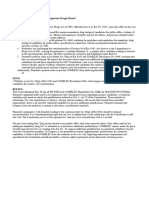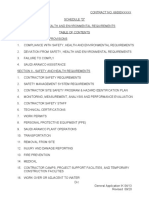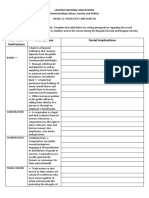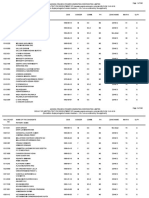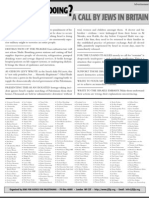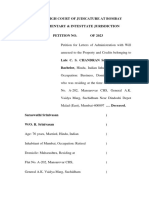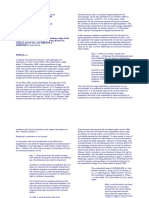0 ratings0% found this document useful (0 votes)
18 viewsMacalintal v. COMELEC, G.R. No. 157013, 10 Jul 2003.
Macalintal v. COMELEC, G.R. No. 157013, 10 Jul 2003.
Uploaded by
Adrheyni Kyle Cabug-os(1) The petitioner challenged certain provisions of the Overseas Absentee Voting Act of 2003 (RA 9189) on constitutional grounds, specifically the residency requirement for overseas voters.
(2) Section 5(d) of RA 9189 allows immigrants or permanent residents abroad to register by executing an affidavit declaring their intent to return within 3 years, without having lost Philippine citizenship.
(3) The Court upheld the constitutionality of Section 5(d), finding that the affidavit requirement maintains the voter's Philippine domicile and deterrents are in place if they fail to return as promised. The Court will not repeal a law based on impracticality alone.
Copyright:
© All Rights Reserved
Available Formats
Download as PDF, TXT or read online from Scribd
Macalintal v. COMELEC, G.R. No. 157013, 10 Jul 2003.
Macalintal v. COMELEC, G.R. No. 157013, 10 Jul 2003.
Uploaded by
Adrheyni Kyle Cabug-os0 ratings0% found this document useful (0 votes)
18 views4 pages(1) The petitioner challenged certain provisions of the Overseas Absentee Voting Act of 2003 (RA 9189) on constitutional grounds, specifically the residency requirement for overseas voters.
(2) Section 5(d) of RA 9189 allows immigrants or permanent residents abroad to register by executing an affidavit declaring their intent to return within 3 years, without having lost Philippine citizenship.
(3) The Court upheld the constitutionality of Section 5(d), finding that the affidavit requirement maintains the voter's Philippine domicile and deterrents are in place if they fail to return as promised. The Court will not repeal a law based on impracticality alone.
Original Description:
case digest: left side is a shorter version, right side is the longer version of the case
Copyright
© © All Rights Reserved
Available Formats
PDF, TXT or read online from Scribd
Share this document
Did you find this document useful?
Is this content inappropriate?
(1) The petitioner challenged certain provisions of the Overseas Absentee Voting Act of 2003 (RA 9189) on constitutional grounds, specifically the residency requirement for overseas voters.
(2) Section 5(d) of RA 9189 allows immigrants or permanent residents abroad to register by executing an affidavit declaring their intent to return within 3 years, without having lost Philippine citizenship.
(3) The Court upheld the constitutionality of Section 5(d), finding that the affidavit requirement maintains the voter's Philippine domicile and deterrents are in place if they fail to return as promised. The Court will not repeal a law based on impracticality alone.
Copyright:
© All Rights Reserved
Available Formats
Download as PDF, TXT or read online from Scribd
Download as pdf or txt
0 ratings0% found this document useful (0 votes)
18 views4 pagesMacalintal v. COMELEC, G.R. No. 157013, 10 Jul 2003.
Macalintal v. COMELEC, G.R. No. 157013, 10 Jul 2003.
Uploaded by
Adrheyni Kyle Cabug-os(1) The petitioner challenged certain provisions of the Overseas Absentee Voting Act of 2003 (RA 9189) on constitutional grounds, specifically the residency requirement for overseas voters.
(2) Section 5(d) of RA 9189 allows immigrants or permanent residents abroad to register by executing an affidavit declaring their intent to return within 3 years, without having lost Philippine citizenship.
(3) The Court upheld the constitutionality of Section 5(d), finding that the affidavit requirement maintains the voter's Philippine domicile and deterrents are in place if they fail to return as promised. The Court will not repeal a law based on impracticality alone.
Copyright:
© All Rights Reserved
Available Formats
Download as PDF, TXT or read online from Scribd
Download as pdf or txt
You are on page 1of 4
Macalintal v. COMELEC, G.R. No. 157013, 10 Jul 2003.
FACTS:
Macalintal, a member of the Philippine Bar, seek... declaration that
FACTS:
certain provisions of Republic Act No. 9189 (The Overseas Absentee
Before the Court is a petition for certiorari and prohibition filed by
Voting Act of 2003)... suffer from constitutional infirmity.
Romulo B. Macalintal, a member of the Philippine Bar, seeking a
declaration that certain provisions of Republic Act No. 9189 (The R.A. No. 9189, entitled, "An Act Providing for A System of Overseas
Overseas Absentee Voting Act of 2003) suffer from constitutional Absentee Voting by Qualified Citizens of the Philippines Abroad,
infirmity. Claiming that he has actual and material legal interest in Appropriating Funds Therefor, and for Other Purposes," appropriates
the subject matter of this case in seeing to it that public funds are funds under Section 29 thereof which provides that a supplemental...
properly and lawfully used and appropriated, petitioner filed the budget on the General Appropriations Act of the year of its
instant petition as a taxpayer and as a lawyer. enactment into law shall provide for the necessary amount to carry
out its provisions. Taxpayers, such as herein petitioner, have the right
ISSUES: to restrain officials from wasting public funds through the
enforcement of an... unconstitutional statute.
(1) Whether or not Section 5(d) of Republic Act No. 9189 violates the
residency requirement in Section 1 of Article V of the Constitution. The challenged provision of law involves a public right that affects a
(2) Whether or not Section 18.5 of the same law violates the great number of citizens. The Court has adopted the policy of taking
constitutional mandate under Section 4, Article VII of the jurisdiction over cases whenever the petitioner has seriously and
Constitution that the winning candidates for President and the convincingly presented an issue of transcendental significance to the
Vice-President shall be proclaimed as winners by Congress. Filipino people.
(3) Whether or not Congress may, through the Joint Congressional he need to consider the constitutional issues raised before the Court
Oversight Committee created in Section 25 of Rep. Act No. 9189, is... buttressed by the fact that it is now more than fifteen years since
exercise the power to review, revise, amend, and approve the the ratification of the 1987 Constitution requiring Congress to
Implementing Rules and Regulations that the Commission on provide a system for absentee voting by qualified Filipinos... abroad.
Elections, promulgate without violating the independence of the
COMELEC under Section 1, Article IX-A of the Constitution. Thus, strong reasons of public policy demand that the Court resolves
the instant petition... and determine whether Congress has acted
HELD: within the limits of the Constitution or if it had gravely abused the
discretion entrusted to it.
(1) No. Section 5 of RA No. 9189 enumerates those who are
Petitioner posits that Section 5(d) is unconstitutional because it
disqualified voting under this Act. It disqualifies an immigrant or a
violates Section 1, Article V of the 1987 Constitution which requires
permanent resident who is recognized as such in the host country.
that the voter must be a resident in the Philippines for at least one
However, an exception is provided i.e. unless he/she executes, upon
registration, an affidavit prepared for the purpose by the Commission
declaring that he/she shall resume actual physical permanent year and in the place where he proposes to vote for at least six...
residence in the Philippines not later than 3 years from approval of months immediately preceding an election.
registration. Such affidavit shall also state that he/she has not He claims that the right of suffrage... should not be granted to
applied for citizenship in another country. Failure to return shall be anyone who, on the date of the election, does not possess the
cause for the removal of the name of the immigrant or permanent qualifications provided for by Section 1, Article V of the Constitution.
resident from the National Registry of Absentee Voters and his/her
Issues:
permanent disqualification to vote in absentia.
Does Section 5(d) of Rep. Act No. 9189 allowing the registration of
Petitioner claims that this is violative of the residency requirement in voters who are immigrants or permanent residents in other
Section 1 Article V of the Constitution which requires the voter must countries... by their mere act of executing an affidavit expressing
be a resident in the Philippines for at least one yr, and a resident in their intention to return to the Philippines, violate the residency
the place where he proposes to vote for at least 6 months requirement in
immediately preceding an election.
Section 1 of Article V of the Constitution?
However, OSG held that ruling in said case does not hold water at Ruling:
present, and that the Court may have to discard that particular ruling.
Panacea of the controversy: Affidavit for without it, the presumption R.A. No. 9189 was enacted in obeisance to the mandate of the first
of abandonment of Phil domicile shall remain. The qualified Filipino paragraph of Section 2, Article V of the Constitution that Congress
abroad who executed an affidavit is deemed to have retained his shall provide a system for voting by qualified Filipinos abroad.
domicile in the Philippines and presumed not to have lost his
It must be stressed that Section 2 does not provide for the
domicile by his physical absence from this country. Section 5 of RA
parameters of... the exercise of legislative authority in enacting said
No. 9189 does not only require the promise to resume actual
law. Hence, in the absence of restrictions, Congress is presumed to
physical permanent residence in the Philippines not later than 3
have duly exercised its function as defined in Article VI (The
years after approval of registration but it also requires the Filipino
Legislative Department) of the Constitution.
abroad, WON he is a green card holder, a temporary visitor or even on
business trip, must declare that he/she has not applied for Such statutes are regarded as conferring a privilege and not a right,
citizenship in another country. Thus, he/she must return to the or an absolute right. When the legislature chooses to grant the right
Philippines otherwise consequences will be met according to RA No. by statute, it must operate with equality among all the class to which
9189. it is granted; but statutes of this nature may be limited in... their
application to particular types of elections. The statutes should be
Although there is a possibility that the Filipino will not return after he construed in the light of any constitutional provisions affecting
has exercised his right to vote, the Court is not in a position to rule on registration and elections, and with due regard to their texts prior to
the wisdom of the law or to repeal or modify it if such law is found to amendment and to predecessor statutes and... the decisions
be impractical. However, it can be said that the Congress itself was
conscious of this probability and provided for deterrence which is thereunder; they should also be construed in the light of the
that the Filipino who fails to return as promised stands to lose his circumstances under which they were enacted; and so as to carry out
right of suffrage. Accordingly, the votes he cast shall not be the objects thereof, if this can be done without doing violence to their
invalidated because he was qualified to vote on the date of the provisions and mandates. Further, in passing on... statutes regulating
elections. absentee voting, the court should look to the whole and every part of
the election laws, the intent of the entire plan, and reasons and spirit
of their adoption, and try to give effect to every portion thereof.
Expressum facit cessare tacitum: where a law sets down plainly its
whole meaning, the Court is prevented from making it mean what the Ordinarily, an absentee is not a resident and vice versa; a person
Court pleases. In fine, considering that underlying intent of the cannot be at the same time, both a resident and an absentee.[30]
Constitution, as is evident in its statutory construction and intent of However, under our election laws and the countless pronouncements
the framers, which is to grant Filipino immigrants and permanent of the Court pertaining to elections, an absentee... remains attached
residents abroad the unquestionable right to exercise the right of to his residence in the Philippines as residence is considered
suffrage (Section 1 Article V) the Court finds that Section 5 of RA No. synonymous with domicile.
9189 is not constitutionally defective.
For political purposes the concepts of residence and domicile are
dictated by the peculiar criteria of political laws. As these concepts
(2) Yes. Congress should not have allowed COMELEC to usurp a
have evolved in our election law, what has clearly and unequivocally
power that constitutionally belongs to it. The canvassing of the votes
emerged is the fact that residence for election purposes... is used
and the proclamation of the winning candidates for President and
synonymously with domicile.
Vice President for the entire nation must remain in the hands of
Congress as its duty and power under Section 4 of Article VII of the Thus, the Constitutional Commission recognized the fact that while
Constitution. COMELEC has the authority to proclaim the winning millions of Filipinos reside abroad principally for economic reasons
candidates only for Senators and Party-list Reps. and hence they contribute in no small measure to the economic
uplift of this country, their voices are marginal insofar as the choice
(3) No. By vesting itself with the powers to approve, review, amend of... this country's leaders is concerned.
and revise the Implementing Rules & Regulations for RA No. 9189,
Congress went beyond the scope of its constitutional authority. It is in pursuance of that intention that the Commission provided for
Congress trampled upon the constitutional mandate of Section 2 immediately after the residency requirement of Section 1.
independence of the COMELEC. Under such a situation, the Court is By the doctrine of necessary implication in statutory construction,
left with no option but to withdraw from its usual silence in declaring which may be applied in construing constitutional... provisions,... the
a provision of law unconstitutional. strategic location of Section 2 indicates that the Constitutional
Commission provided for an exception to the actual residency
requirement of Section 1 with respect to qualified Filipinos abroad.
The same Commission has in... effect declared that qualified
Filipinos who are not in the Philippines may be allowed to vote even not otherwise disqualified by law, who has not relinquished Philippine
though they do not satisfy the residency requirement in Section 1, citizenship and who has not actually abandoned his/her... intentions
Article V of the Constitution. to return to his/her domicile of origin, the Philippines, is allowed to
register and vote in the Philippine embassy, consulate or other
Contrary to the claim of petitioner, the execution of the affidavit itself
foreign service establishments of the place which has jurisdiction
is not the enabling or enfranchising act. The affidavit required in
over the country where he/she has indicated his/her address for...
Section 5(d) is not only proof of the intention of the immigrant or
purposes of the elections, while providing for safeguards to a clean
permanent resident to go back and resume residency in the
election.
Philippines, but more significantly, it serves as an explicit expression
that he had not in fact abandoned his domicile of origin. Thus, it is
not correct to say that the execution of the affidavit under Section
5(d) violates the Constitution that proscribes "provisional...
registration or a promise by a voter to perform a condition to be
qualified to vote in a political exercise."
To repeat, the affidavit is required of immigrants and permanent
residents abroad because by their status in their host countries, they
are presumed to have relinquished their intent to return to this
country; thus, without the affidavit, the presumption of abandonment
of
Philippine domicile shall remain.
It must be emphasized that Section 5(d) does not only require an
affidavit or a promise to "resume actual physical permanent
residence in the Philippines not later than three years from approval
of his/her registration," the Filipinos abroad must also declare that
they have... not applied for citizenship in another country. Thus, they
must return to the Philippines; otherwise, their failure to return "shall
be cause for the removal" of their names "from the National Registry
of Absentee Voters and his/her permanent disqualification to vote
in... absentia."
Thus, Congress crafted a process of registration by which a Filipino
voter permanently residing abroad who is at least eighteen years old,
You might also like
- The Subtle Art of Not Giving a F*ck: A Counterintuitive Approach to Living a Good LifeFrom EverandThe Subtle Art of Not Giving a F*ck: A Counterintuitive Approach to Living a Good LifeRating: 4 out of 5 stars4/5 (5973)
- The Gifts of Imperfection: Let Go of Who You Think You're Supposed to Be and Embrace Who You AreFrom EverandThe Gifts of Imperfection: Let Go of Who You Think You're Supposed to Be and Embrace Who You AreRating: 4 out of 5 stars4/5 (1110)
- Never Split the Difference: Negotiating As If Your Life Depended On ItFrom EverandNever Split the Difference: Negotiating As If Your Life Depended On ItRating: 4.5 out of 5 stars4.5/5 (893)
- Hidden Figures: The American Dream and the Untold Story of the Black Women Mathematicians Who Helped Win the Space RaceFrom EverandHidden Figures: The American Dream and the Untold Story of the Black Women Mathematicians Who Helped Win the Space RaceRating: 4 out of 5 stars4/5 (932)
- Grit: The Power of Passion and PerseveranceFrom EverandGrit: The Power of Passion and PerseveranceRating: 4 out of 5 stars4/5 (619)
- Shoe Dog: A Memoir by the Creator of NikeFrom EverandShoe Dog: A Memoir by the Creator of NikeRating: 4.5 out of 5 stars4.5/5 (545)
- The Hard Thing About Hard Things: Building a Business When There Are No Easy AnswersFrom EverandThe Hard Thing About Hard Things: Building a Business When There Are No Easy AnswersRating: 4.5 out of 5 stars4.5/5 (355)
- Elon Musk: Tesla, SpaceX, and the Quest for a Fantastic FutureFrom EverandElon Musk: Tesla, SpaceX, and the Quest for a Fantastic FutureRating: 4.5 out of 5 stars4.5/5 (476)
- Her Body and Other Parties: StoriesFrom EverandHer Body and Other Parties: StoriesRating: 4 out of 5 stars4/5 (831)
- The Emperor of All Maladies: A Biography of CancerFrom EverandThe Emperor of All Maladies: A Biography of CancerRating: 4.5 out of 5 stars4.5/5 (274)
- The Little Book of Hygge: Danish Secrets to Happy LivingFrom EverandThe Little Book of Hygge: Danish Secrets to Happy LivingRating: 3.5 out of 5 stars3.5/5 (424)
- The World Is Flat 3.0: A Brief History of the Twenty-first CenturyFrom EverandThe World Is Flat 3.0: A Brief History of the Twenty-first CenturyRating: 3.5 out of 5 stars3.5/5 (2272)
- The Yellow House: A Memoir (2019 National Book Award Winner)From EverandThe Yellow House: A Memoir (2019 National Book Award Winner)Rating: 4 out of 5 stars4/5 (99)
- Devil in the Grove: Thurgood Marshall, the Groveland Boys, and the Dawn of a New AmericaFrom EverandDevil in the Grove: Thurgood Marshall, the Groveland Boys, and the Dawn of a New AmericaRating: 4.5 out of 5 stars4.5/5 (270)
- The Sympathizer: A Novel (Pulitzer Prize for Fiction)From EverandThe Sympathizer: A Novel (Pulitzer Prize for Fiction)Rating: 4.5 out of 5 stars4.5/5 (124)
- Team of Rivals: The Political Genius of Abraham LincolnFrom EverandTeam of Rivals: The Political Genius of Abraham LincolnRating: 4.5 out of 5 stars4.5/5 (235)
- A Heartbreaking Work Of Staggering Genius: A Memoir Based on a True StoryFrom EverandA Heartbreaking Work Of Staggering Genius: A Memoir Based on a True StoryRating: 3.5 out of 5 stars3.5/5 (232)
- On Fire: The (Burning) Case for a Green New DealFrom EverandOn Fire: The (Burning) Case for a Green New DealRating: 4 out of 5 stars4/5 (75)
- The Unwinding: An Inner History of the New AmericaFrom EverandThe Unwinding: An Inner History of the New AmericaRating: 4 out of 5 stars4/5 (45)
- Alfon V RepublicDocument1 pageAlfon V RepublicAdrheyni Kyle Cabug-osNo ratings yet
- Belgica V Ochoa Case DigestDocument3 pagesBelgica V Ochoa Case DigestAdrheyni Kyle Cabug-osNo ratings yet
- Social Justice Society V Dangerous Drug Board - Case DigestDocument1 pageSocial Justice Society V Dangerous Drug Board - Case DigestAdrheyni Kyle Cabug-osNo ratings yet
- Jardin V NLRCDocument2 pagesJardin V NLRCAdrheyni Kyle Cabug-osNo ratings yet
- LulaccbpDocument116 pagesLulaccbpAdrheyni Kyle Cabug-osNo ratings yet
- Youth Group Sample BylawsDocument9 pagesYouth Group Sample BylawsAdrheyni Kyle Cabug-osNo ratings yet
- Concept Note 1 Online Branding in SMEs in Tacloban City - Strategic Initiative During Covid-19 PandemicDocument3 pagesConcept Note 1 Online Branding in SMEs in Tacloban City - Strategic Initiative During Covid-19 PandemicAdrheyni Kyle Cabug-osNo ratings yet
- MGT 199.1 - Research Design - Brosas & CayacoDocument2 pagesMGT 199.1 - Research Design - Brosas & CayacoAdrheyni Kyle Cabug-osNo ratings yet
- Constitution and by Laws SampleDocument6 pagesConstitution and by Laws SampleAdrheyni Kyle Cabug-osNo ratings yet
- Chapter 1 Draft-Brosas, Cabug-Os, CayacoDocument20 pagesChapter 1 Draft-Brosas, Cabug-Os, CayacoAdrheyni Kyle Cabug-osNo ratings yet
- Brosas, Cabug-Os & Cayaco - RRL (Final Draft)Document8 pagesBrosas, Cabug-Os & Cayaco - RRL (Final Draft)Adrheyni Kyle Cabug-osNo ratings yet
- The Biography of Bessie HeadDocument12 pagesThe Biography of Bessie Headsandip pandeyNo ratings yet
- Obligation and Contract Case DigestDocument4 pagesObligation and Contract Case DigestPhlpost Legal DepartmentNo ratings yet
- Schedule D SAFETY, HEALTH AND ENVIRONMENTAL REQUIREMENTSDocument26 pagesSchedule D SAFETY, HEALTH AND ENVIRONMENTAL REQUIREMENTSxue jun xiangNo ratings yet
- Why Indian Electoral Bonds Are Undemocratic 1666150423Document4 pagesWhy Indian Electoral Bonds Are Undemocratic 1666150423Animesh KumarNo ratings yet
- (To Be Filled Up in Capital Letter) : Form NoDocument1 page(To Be Filled Up in Capital Letter) : Form Noomprakash pal100% (2)
- ONLINE - Property, Casualty, Marine Claim Form 2020Document2 pagesONLINE - Property, Casualty, Marine Claim Form 2020kimdodok123No ratings yet
- C 2003 21 0 1Document11 pagesC 2003 21 0 1Jacky_LEOLEONo ratings yet
- Market Structures - Part 3: Advantages Disadvantages Perfect CompetitionDocument3 pagesMarket Structures - Part 3: Advantages Disadvantages Perfect Competitionkriston khanNo ratings yet
- Excel Professional Services, Inc.: Discussion QuestionsDocument5 pagesExcel Professional Services, Inc.: Discussion QuestionsSadAccountantNo ratings yet
- Employment Application FormDocument5 pagesEmployment Application Formputra adamNo ratings yet
- Revolution in Our Time by Kekla Magoon Chapter SamplerDocument80 pagesRevolution in Our Time by Kekla Magoon Chapter SamplerCandlewick Press100% (1)
- Siddheswar ResumeDocument3 pagesSiddheswar Resumebhaisahh583No ratings yet
- ContractDocument32 pagesContracta.yasserNo ratings yet
- Future of Human Settlements in GhanaDocument5 pagesFuture of Human Settlements in GhanaVerna03No ratings yet
- 08.0 PP 23 32 Prologue Yudhoyonos Legacy An Insiders ViewDocument10 pages08.0 PP 23 32 Prologue Yudhoyonos Legacy An Insiders ViewKilitus WetipoNo ratings yet
- Final-Activity 1 q2Document2 pagesFinal-Activity 1 q2Hairoden MauntolNo ratings yet
- SDL 13 - 200391Document9 pagesSDL 13 - 200391YASMIN HUMAIRAH BINTI MOHAMAD FAUZI / UPMNo ratings yet
- Government Accounting Punzalan Solman Chap 2Document6 pagesGovernment Accounting Punzalan Solman Chap 2Alarich Catayoc100% (1)
- Es - Automated Sf9 For Sy 2021-2022Document29 pagesEs - Automated Sf9 For Sy 2021-2022Luz Racraquin LRNo ratings yet
- Exam Results APGENCO Junior Accounts OfficerDocument240 pagesExam Results APGENCO Junior Accounts Officervenkat414No ratings yet
- All Model Price Lists BS6.2 - Wef 01.04Document2 pagesAll Model Price Lists BS6.2 - Wef 01.04Gagan H.CNo ratings yet
- Ob - Unit 3 - Note - 24 - Status - Group PropertiesDocument4 pagesOb - Unit 3 - Note - 24 - Status - Group PropertiesSumit BainNo ratings yet
- HRM - Chap4. Personnel Planning and RecruitingDocument28 pagesHRM - Chap4. Personnel Planning and RecruitingHuyền MaiNo ratings yet
- ICFR - NewDocument31 pagesICFR - NewAnupam BaliNo ratings yet
- Detailed Lesson Plan-BCSHS-Filipino IdentityDocument12 pagesDetailed Lesson Plan-BCSHS-Filipino IdentityAnn Fatima CancioNo ratings yet
- LLB 5 Sem SyllabusDocument3 pagesLLB 5 Sem SyllabusMADHUR TRIPATHINo ratings yet
- Jews For Palestinian JusticeDocument1 pageJews For Palestinian Justicehembusan67% (3)
- Consent Affidavit Annapoorni Iyer - SJ 31102023Document4 pagesConsent Affidavit Annapoorni Iyer - SJ 31102023joshisatish1986No ratings yet
- Gandionco V PenarandaDocument3 pagesGandionco V PenarandaAggy AlbotraNo ratings yet
- Finals LeaDocument44 pagesFinals LeaFrancesca EspirituNo ratings yet










































